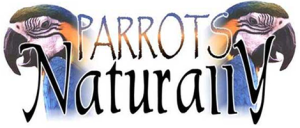Nutrition
A word about nutrition

Sensible nutrition — easily!
We wean our babies onto all of the healthy alternatives. We feel that they will thrive in modern homes, even with most of us living at a fast pace. Planning for your bird’s diet should not be a problem if you and your family have a healthy diet. In fact, we have heard from several of our bird-owning friends that preparing the proper foods for their bird has helped improve their diet!
What does our Parrot Food Pyramid look like?
- What we call “soft” or “wet” or “fresh” food is 50 to 60% of the diet. This consists of fresh, sprouted seeds, rice and beans, healthy organic vegetables (some steamed to release beta-carotene, a precursor to vitamin A and an absolute must for parrots) and fruits. We prefer to feed the soft food in the morning, but you may prefer to feed at night so that the bird eats when you do. Parrots are extremely gregarious and intelligent; they see themselves as family members and will actually eat better when they observe you eating.
Remove soft food from the cage within two hours of preparation so mold and bacteria do not have time to develop. Remove soft or wet food after an hour during the summer and warmer months, and in high humidity. - Approximately 30 to 40% of the diet is a good mix or pelleted food (with no artificial coloring). Pelleted food, seed or a mixture of both should be available to the bird at all times. When we offer fresh food to a baby, we like to remove the dry food so that the baby concentrates on the nutritious fruits and veggies.
- 10% of the diet is nutritious people food. Offer a variety of foods including pasta, potatoes, veggies, fruits, and some meat (not fried). Your bird might enjoy pulling the meat from a chicken leg and working on the bone (the little cannibal!). If you have a vegetarian diet, you do not have to offer meat to your bird; you will undoubtedly know how to provide the proper protein balance with legumes and rice.
Smart shopping for seed mixes
Packaged mixes are marketed to appeal to you. If your bird had the purchasing power, you’d be preparing fresh foods like sprouts! That’s why it’s good to remember the following:
- Beware of green or pink rubbery fruits in mixes. These mixes are outrageously expensive and easily turn rancid and buggy. Too much moisture in the mix causes the seeds to go bad
- Avoid the new mixes with heavily-sugared fruits that look like candy. Fungi and mold thrive on simple sugars, and there’s a lot of sugar in these mixes. Remember, feeding heavily-sweetened products to your bird can create the right environment for a nasty illness such as Candida and Aspergillosis — especially in a bird with a compromised immune system.
- Look for a preponderance of orange-colored food—not just the occasional big chunk and fruit piece. The best ingredients for your bird include dried sweet potato, carrots and papaya, which are all very good sources of vitamin A. We use these nutritious foods in all of our New Millennium mixes (which are very low in moisture content).
- Examine the nuts. Don’t buy mixes that contain nuts in the shell unless they are raw, unsalted pistachios or raw, natural, shelled almonds. Walnuts and other big nuts create problems — one bad walnut can contaminate hundreds of pounds of mix! Soak and scrub your nuts before you feed them, and serve them separately.
Now you know why we use a lot of shelled (shells removed) nuts in our mixes and sell them separately. We do not sell peanuts in the shell or add them to any of our seed mixes — they are too easily contaminated with aflatoxins, which are deadly to birds, other animals, and humans.
We are concerned about genetic engineering of foods because peanut genes are being used in bio-engineered foods. As anyone with a peanut allergy knows, the reaction can be deadly
“Natural” does not equal “harmless”
Just because a product is “natural” doesn’t mean that it is safe. A contaminated shipment of natural peanut butter killed people. Foods fertilized in manure are “natural” but are easily infected with deadly E. coli. Zinc can be toxic to our birds, but it is also needed in microscopic quantities.
Herbs have a chemical basis and some of those chemicals are toxic. Some herbs can be beneficial in a narrow dosage range and deadly otherwise. You have to do your research.
Don’t rush down to the health food store and buy Echinacea, Pau d’Arco, comfrey, borage, or kava kava for your bird. Ask us if you have questions about these substances.
Know your food sources
Concentrate on fresh, certified organic foods, but remember the rule: everything in moderation and concentrate on variety. We stress organic because of repeated warnings for years about the overuse of pesticides here and in other countries. Studies indicate higher concentrations of pesticides in some U.S.–grown vegetables than amounts obtained in imports. Keep an open mind and use common sense.
A final word
Nothing is original. We have all learned and copied nutrition information from the best. Real bird people don’t mind having their diets and philosophies parroted (not pirated) by others.
Nutrition Blog
Sprout Ingredients
About our New Millennium Sprout Ingredients Adzuki beans (also called aduki are considered the king of beans in Japan because they are a source of...
Touting Sprouting
Why do we feed our birds sprouted seeds? Sprouted seed is one of the most healthful foods that you can give to your , and especially the young...

